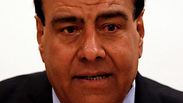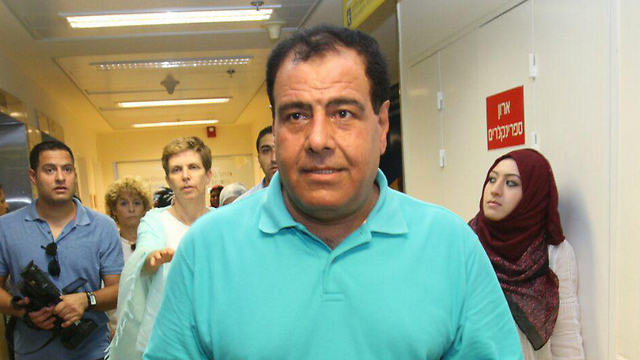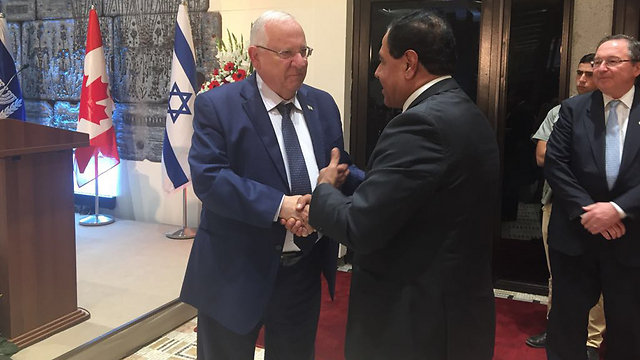
Gaza doctor who lost his daughters: 'Only women can solve the conflict'
Dr. Izzeldin Abuelaish, who lost three daughters to an IDF strike during Operation Cast Lead, remains optimistic peace is possible. 'I'm sure women will succeed where men have failed. Men are motivated by ego; they tried for 100 years and failed. I am sure that ultimately the women will succeed.'
"The solution to the Israeli-Palestinian conflict is to let the women negotiate," says Dr. Izzeldin Abuelaish, a Palestinian doctor from Gaza whose three daughters were killed during Operation Cast Lead when their Jabalya home was hit by IDF tank shells.
"There must be more women around the table. They bring life to the world and they understand what life is, and I'm sure they will succeed where men have failed. Men are motivated by ego; they tried for 100 years and failed. I am sure that ultimately the women will succeed, but even if they do not, it will not deteriorate into violence," he asserts.
Abuelaish, who has been living in Canada for the past few years, working as a professor at the University of Toronto's School of Public Health, arrived in Israel on Sunday to attend the first international conference on removing barriers to peace in the Middle East, organized by Women Wage Peace.
During the conference, experts from Israel and from around the world will formulate a position paper to be submitted to the government on ways to remove obstacles to peace.
Among the participants are Regional Cooperation Minister Tzachi Hanegbi, French Ambassador to Israel Hélène Le Gal and the ambassadors of Canada, Ireland, Cyprus and Finland, and MK Ksenia Svetlova (Zionist Union).
The recent escalation in the south, which almost deteriorated into war, brought back terrible memories for Abuelaish. "The militant way will not put an end to the Palestinian-Israeli conflict," he stresses in an interview with Ynet.
When a reporter reminds him that Prime Minister Benjamin Netanyahu was the one who halted the escalation when he urged the Cabinet to accept the ceasefire after hundreds of rockets were fired at Israel, Abuelaish notes that what sparked the events in the first place was the IDF covert operation deep inside the Gaza Strip that was discovered.
"There was desire to bring about peace via efforts by the Egyptians and the Qataris. The people in Gaza waited for calm, until this incident came and destroyed everything," he says.
And what about the arson terrorism and the attempts to breach the border fence, which have been ongoing since last March?
"If someone crosses the fence and infiltrates Israel, then he deserves to be punished, but the soldiers are not allowed to harm civilians and children in Gaza. The recent events reminded me that we have not learned the lesson, that everyone has an ego, and that there are internal problems in the State of Israel," he replies."Ahead of every election campaign, there are calls to go to war in an effort to earn more (Knesset) seats. It will not help, the blood of innocents, Israelis and Palestinians, is not intended for political gain."
Do you condemn the violence by Hamas?
"With regard to Hamas, I condemn every military action and violence. From everyone. It is not the way to end the Israeli-Palestinian conflict."
Do you understand the suffering of the residents of southern Israel?
"I share and feel their pain, and I hope you and they will feel the pain of more than 2 million Palestinians—who have been living without (running) water for over 10 years, without electricity, without work and without freedom. One must consider the pain of both sides. I see the suffering in Sderot, and we must also take into account Palestinian suffering. Israelis' lives are equal to Palestinian lives."
Are you still optimistic that peace can be achieved?
"Yes. I know that the situation is very difficult and can deteriorate, but I have hope that people will wake up one day—like in 1994 with the Oslo agreement—and there will be good leadership, not like Netanyahu, someone who will recognize the rights of the Palestinians as a people, like the Palestinians who recognized the people of Israel and the State of Israel. People in Israel still believe in peace, there are a lot of voices talking about peace and a Palestinian state, and although they are a minority, we have to look for ways to increase them."
But you seem to be ignoring the stabbings and other brutal attacks lately, such as the terrorist attack in the Barkan industrial zone.
"I condemn violence, and what do you think about the attacks and everything that is happening in Gaza, and about the settlement expansion? Some people prefer to kill their son, but to not have their home destroyed. I condemn the killing of anyone.
"Let us ask how to solve the problem. The patient suffers and the patient is the Palestinian and the Israeli. You have to think about how to heal the patient and not blame him all the time. We are constantly in a cycle of blaming each other. You have to look with a good heart, and learn the lessons from what happened. We have no other choice but to live together in equality, good neighborliness and help one another."
Abuelaish, who maintains contact with his relatives in Gaza, also spoke about the difficult crisis in the Gaza Strip. "The situation in Gaza is terrible, children without a childhood, living in poverty and suffering. Children aged 15 have already lived through three wars. Children without hope, women without work, they have no freedom. The people's lives have been destroyed by the blockade," he lamented.












